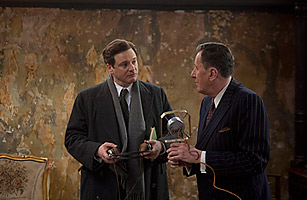
Reader alert: This story quotes quite a few four-letter words, all of them spoken by a future King of England. Some readers may wish to skip the dialogue section after the next boldface advisory.
His elocution teacher worked with George VI to clarify the king’s speech, to unlock his ability to talk to his subjects with ease and power. Now the Weinstein Company, in tandem with the Motion Picture Association of America, has sanitized The King’s Speech. And all so the tweens of America could see Britain’s verbally victorious wartime monarch conquer the stammering problem, without the brief pollution of one vulgar word used 12 times in a single, crucial scene.
The King’s Speech — which won Oscars for Best Picture, Director Tom Hooper, Actor Colin Firth and David Seidler as author of the original screenplay — has earned more than $135 million at theaters in the U.S. and Canada since its premiere last November. But the two countries exercised different standards for who could attend the film. In Canada it was rated “13,” meaning that anyone 13 or older could see it, alone, no questions asked. In the U.S., however; the R rating is meant to refuse admittance to anyone under 17 not accompanied by an adult guardian. Bookish preteens, eager to know how a British monarch learned to speak up against Hitler, had to petition their parents to see the year’s Best Picture.
The MPAA has long been a bane of critics, indie filmmakers and other grownups who charge the group with being biased in favor of big studios and against the little guy, and for being prurient about violence and prudish about sex. The Weinstein Company’s Harvey Weinstein has often fought the group for its harsh ratings of his more adult films; late last year he convinced the MPAA to soften its rating of his Blue Valentine from an NC-17 to an R. And now he finds himself castigated for an uncharacteristic outbreak of timidity, or greed, or concern for the ears of 12-year-olds — all of whom, we’re guessing, have used or heard the words at issue.
The big movie studios fight and wheedle to get a family-friendly PG-13 rating for their expensive films, because that’s where the money is. Of the top 75 box-office winners of all time, only two — The Passion of the Christ in 15th place, and The Hangover at #49 — were rated R. The King’s Speech has already spoken for itself: $375 million at the worldwide box office, on a production budget of just $15 million. But Weinstein must have steamed that his mild-mannered, stateliest-home inspirational drama carried the same rating as gross-out horror films like Saw and My Bloody Valentine 3D. So he constructed an amended version with the naughty bits blotted out. The f-word, which Firth spits out a dozen times in the original, is now whispered just once, and otherwise is replaced with an excremental expletive deemed less harsh to sensitive ears.
This artistic, or rather commercial, license annoyed Firth, who on Oscar night told reporters, “I don’t support it. I think the film has integrity as it stands. I think that scene belongs where it is. I think it serves a purpose.” The cut version also stoked spasms of outrage in the college of critics. “For the benefit of a teensy portion of the population,” wrote John Serba of the Grand Rapids Press, “the artistic vision of director Tom Hooper is compromised …”, and Roger Ebert Tweeted: “Today is the last day you can see ‘The King’s Speech’ with the f-word. F**k!” Note that, in railing against the bowdlerizing of the film’s language, Ebert censored himself.
But if that speech includes the many uses of the f–word — employed, however fleetingly, in this utterly justifiable context — the movie that cites it will be rated R. The MPAA, which serves as the film industry’s censor, typically allows one or two uses of the most common obscenity in a picture with a PG-13 rating; and never mind that plenty of movies, from any Adam Sandler comedy to action films like Battle Los Angeles, The Green Hornet and Sucker Punch, boast a crude, lurid tone that The King’s Speech scrupulously avoids. That’s a distinction observed by censor boards in other countries. A 12-year-old in Ireland or Australia can see the film; and in the King’s homeland, the original rating of “15” was eased to “12” on appeal. But the MPAA’s law is one observed in letter, not in spirit; The King’s Speech broke the bad-language law and would have to pay for it — unless the f–bombs were defused. See the best moments from the 2011 Oscars.
See the top 10 movies of 2010.